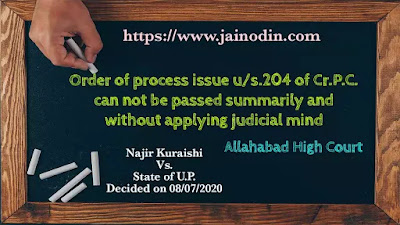A perusal of this impugned summoning order indicates that learned Magistrate had noted in the impugned order the contents of complaint and evidences u/s 200 and 202 Cr.P.C. but had neither any discussion of evidence was made, nor was it considered as to what overt act had allegedly been committed by accused. This contention of learned counsel for the applicants cannot be ruled out that leaned counsel have noted the contents of complaint and statements without considering its probability or prima facie case, and whether he had actually considered statements u/s 200, 202 Cr.P.C. or the documents of the original. At stage of summoning, the Magistrate is not required to meticulously examine or evaluate the evidence. He is not required to record detailed reasons. A brief order which indicate the application of mind is all that is expected of him at the stage. [Para No.7]
8. But in impugned order there is nothing which may indicate that learned Magistrate had even considered facts of the case in hand before passing the summoning order. Impugned order clearly lacks the reflection of application of judicial discretion or mind. Nothing is there which may show that learned Magistrate, before passing of the order under challenge had considered facts of the case and evidence or law. Therefore it appears that, in fact, no judicial mind was applied before the passing of impugned order of summoning. Such order cannot be accepted as a proper legal judicial order passed after following due procedure of law. [Para no.8]
9. In ruling "M/s. Pepsi Food Ltd. & another vs. Special Judicial Magistrate & others, 1998 UPCrR 118" Hon'ble Supreme Court held :-
"Summoning of an accused in a criminal case is a serious matter. Criminal law cannot be set into motion as a matter of course. It is not that the complainant has to bring only two witnesses to support his allegations in the complaint to have the criminal law set into motion. The order of the Magistrate summoning the accused must reflect that he has applied his mind to the facts of the case and the law applicable thereto. He has to examine the nature of allegations made in the complaint and the evidence both oral and documentary in support thereof and would that be sufficient for the complainant to succeed in bringing charge home to the accused. It is not that the Magistrate is a silent spectator at the time of recording of preliminary evidence before summoning the accused. Magistrate had to carefully scrutinize the evidence brought on record and may even himself put questions to the complainant and his witnesses to elicit answers to find out the truthfulness of the allegations or otherwise and then examine if any offence is prima facie committed by all or any of the accused."


